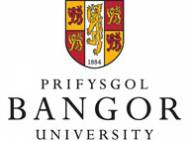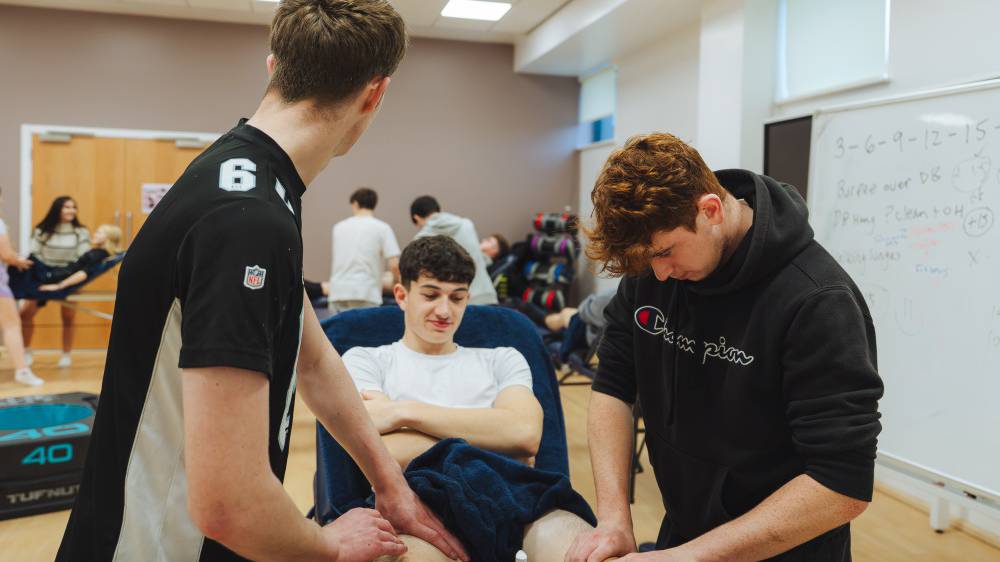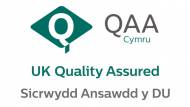Foundation Degree (FdSc) Sports Coaching & Performance Science
Key Details
- Available at:Rhos-on-Sea
- Study Mode:Part-time, Full-time
- Course Length:
Full-time: 2 years OR Part-time: 4 years. Also available on a modular basis.
Monday & Tuesday, 9am - 5pm
- UCAS Codes:CX6C
Foundation Degree (FdSc) Sports Coaching & Performance ScienceUniversity-level Courses
Part Time
If you are applying to study part-time you can apply directly to the campus of your choice.
Full Time
There are two ways to apply to study for a full-time higher education course - either through UCAS or directly to the college.
Applying through UCAS:
You should apply through UCAS if you are currently studying for A Levels, a vocational Level 3 course (i.e. BTEC) or an Access to Higher Education qualification, or if you wish to apply to more than one higher education provider.
There are two ways to apply to study for a full-time higher education course - either through UCAS or directly to the college.
Course Description
This Foundation Degree is suitable for learners who wish to pursue a career in a range of sporting careers, including sports coaching, performance environments and fitness industry.
The Foundation degree is designed to develop your understanding of sports coaching and performance science through the analysis of principles, concepts and contemporary issues, by applying them in practical situations.
Using a multi-disciplinary approach to the field, students will gain knowledge of the different areas that can be applied to many different sporting situations to help you improve levels of sport performance and engagement. These include coaching, physiology, psychology, nutrition, strength and conditioning, and athletic development.
Modules include:
Year 1 (Level 4)
- Coaching Toolkit
- Coaching Pedagogy
- Functional Anatomy
- Sports Nutrition & Performance
- Research Methods & Study Skills
- Human Physiology & Assessment
- Fundamentals of Sports Psychology
- Developing a Professional Identity
Year 2 (Level 5)
- Professional Practice in the Sporting World
- Research Methods
- Psychology of Coaching Leadership
- Optimising Human Performance
- Performance Analysis
- Developing Athletes & Young People
- Applied Strength, Conditioning & Rehabilitation
Additional information
More detailed information on Modules is to be found in the ‘Additional Campus/Course Information’ section.
Entry Criteria
Foundation degrees are designed for students with a range of abilities, including those with no formal qualifications. Admission is founded upon the likelihood of an individual’s ability to complete the programme successfully and to derive benefit from it.
For individuals with no formal qualifications, admission is based upon, but not exclusive to:
- A personal statement or CV, assessment at interview, performance in tasks set specifically for admission purposes, relevant work experience and employment references.
For individuals with formal qualifications, the following are acceptable:
- a minimum of 64 UCAS tariff points in a main level 3 qualification, usually gaining a pass in at least one relevant subject which could include: A Levels, BTEC, International Baccalaureate, ACCESS to HE; or NVQ Level 3; many additional qualifications from Wales, England and Scotland are accepted to support the UCAS points in addition to the relevant subject, such as the Welsh Baccalaureate.
- GCSE Mathematics/Numeracy, grade C/4 or above, or Key/Essential Skill equivalent level. For applicants without these qualifications, evidence of numeracy skills at a suitable level to meet the demands of the programme successfully, will need to be demonstrated. Opportunities to resit GCSE may be available where timetables permit.
- Equivalent international qualifications are acceptable
Language requirements:
- GCSE in Welsh or English as first language, grade C/4 or equivalent
- Any degrees, diplomas or certificates eligible above should have been taught and assessed in Welsh/English
- For overseas applicants, for entry onto Level 4: IELTS 5.5 or higher (with no element less than 5.0)
- For overseas applicants, for entry onto Levels 5: IELTS 6.0 or higher (with no element less than 5.5).
Satisfactory Disclosure and Barring Service (DBS) clearance is required for external placements.
All places are subject to satisfactory interview.
If your qualifications do not meet the entry requirements listed above, we would still encourage you to apply for the course you're interested in, as many of our courses will consider learners based on their previous work and skills experience rather than their qualifications.
Delivery
The course is delivered through a blend of the following:
- Lecture Presentations
- Practical sessions
- Collaborative learning
- External visits
- Placements
- Seminars
Students are responsible for organising their own work experience if it is a requirement on their programme, and they will be supported by the course team.
Timetable
2 days a week (typically 9am - 4:30pm)
- Year 1: Monday & Tuesday
- Year2: Thursday & Friday
Typically, it will take around 100 notional learning hours per 10 credit modules, with an approximate 30% scheduled learning and guided activity and 70% independent study. The scheduled learning may vary per module depending on the type of delivery, subject content requirements and the independent study may vary based on individual student’s development. The guide for students is to plan for 1200 notional learning hours per year, with approximately 360 hours scheduled learning hours (typically over 30 weeks), including timetabled hours, work placement, employability based learning and guided activity, and approximately 840 hours independent study hours per year of study.
As part of this foundation degree students will undertake a minimum of 150 cumulative hours of work experience as part of the programme at level 4 and level 5, within a relevant vocational sector.
A log of hours and reflection within the student/employer guide will be used to evidence the hours completed and reflection of learning. This will form part of the summative assessment (pass/fail) at level 4 and level 5 for the foundation degree.
Students will need to find, agree and partake in work experience. Students will be supported by the teaching team with research, discussing suitable workplaces, applications for the work placement and understanding how this can support the learning outcomes. Students will need to check with the suitable work experience place on their requirements before starting the work experience, as some sectors may need you to have a Satisfactory Disclosure and Barring Service (DBS) clearance before you start the placement. Learner Services can support you with this process.
Fees
Visit our course fees page for information on full and part-time degree course fees.
Financial Support
Visit our financial support page for information on the range of support available.
Additional costs
Additional costs may be associated with the following:
- GLlM sportswear (optional: £20-£40)
- Academic poster printing (£5)
- Vocational and professional industry qualifications (optional: Example - Football Leaders Award £70)
- External Trip (optional: e.g. Middlesex University Student S&C Conference £25)
More detailed information on other costs associated with your course and work placements/work experience (if applicable) will be outlined in the programme validation document and explained to you at your interview.
Start date
September
Contact
For specific course enquiries, please contact:
Steve Kehoe (Programme Leader): kehoe1s@gllm.ac.uk
Sian Backhouse (Administration): backho1s@gllm.ac.uk
For general enquiries about our degrees, please contact: degrees@gllm.ac.uk
Assessment
The course is assessed through a blend of the following:
- Essays
- Reports
- Practical Assessments
- Coaching Skills Assessments
- Presentations (Group & Individual)
- Exam
- Portfolio
- Reflective Writing
- Case Studies
- Podcasts
- Development of Training Plan
Feedback
Where relevant, assessments will be marked and returned to students with constructive and developmental feedback. Effective feedback combines information which enables students to understand the strengths and limitations of their past performance, and information which enables them to recognise how future performance can be improved. Students will be provided with feedback in a timely manner and this feedback will justify how the grade has been awarded. Students will have the opportunity to reflect on the feedback given and identify their strengths, things they found challenging and areas for development that they will feed forward to their next assessment. Feedback will include linking evidence to assessment criteria to demonstrate how the student will have met the learning outcomes.
Progression
The course provides a number of options for professional and educational progression. Many students choose to progress onto Level 6 to complete the BSc (Hons) degree in one additional year. Afterwards, they may also complete a PGCE in order to enter PE teaching.
Alternatively, the Foundation Degree can lead directly into employment in the public or private sector. You could work as a coach or coaching manager, or you could work in sports science support or sports development. You may also enter health related or scientific professions, where your research experience has direct relevance.
Campus Information Rhos-on-Sea
Unit Information
For every 10 credits, students should engage with around 100 notional hours of learning. This will be approximately 30% direct learning contact and 70% independent student learning.
The course consists of the following modules:
Year 1 (Level 4)
Coaching Toolkit (10 credits)
The aim of this module is to provide the basic coaching skills required to plan and deliver coaching sessions in a safe, inclusive and effective manner. Students will gain practical coaching experience and have the opportunity to develop their skills.
- Assessment 1: Session Plan 30%
- Assessment 2: Coaching Skill Delivery 70%
Coaching Pedagogy (20 credits)
The aim of this module is to introduce the theoretical concepts of the coaching process in a practically derived way, providing students with the experience of using best practice techniques in a variety of sporting situations. Students will also have the opportunity to plan, deliver and evaluate their coaching sessions.
- Assessment 1: Practical Coaching Session 50%
- Assessment 2: Written Coaching review 50%
Functional Anatomy (10 credits)
The aim of this module is to provide the knowledge of fundamental concepts of human anatomy which underpin human function and their relationship to kinesiology principles.
- Assessment 1: Exam 50%
- Assessment 2: Skills Movement Presentation 50%
Sports Nutrition & Performance (20 credits)
The purpose of this module is to provide students with an introduction into sports nutrition, the role nutrition plays in both health and performance benefits and how dietary supplements (ergogenic aids) can be included within athletic populations
- Assessment 1: Dietary Analysis 60%
- Assessment 2: Group Presentation: Ergogenic Aids to Improve Performance 40%
Research Methods & Study Skills (10 credits)
The module aims to develop the student’s capacity to apply a range of academic skills appropriately within a chosen discipline. It will enable students to develop skills in understanding how to conduct appropriate research, the use of academic conventions, academic writing and the management and organisation of their work. The module will also introduce basic concepts of data handling and analysis
- Assessment 1: Portfolio 100%
- Section 1 – Evidence of study skill development (50%)
- Section 2 – Academically written section - Development of a research question outline. (50%)
Human Physiology & Assessment (20 credits)
The aim of this module is to build upon the knowledge of human anatomy and introduce the physiological elements of various body systems and how these might be assessed. Students will become familiar with testing techniques and protocols, while developing practical skills, data handling and key concepts of human physiology. Students will also gain practical experience relating to code of conduct, ethical and moral considerations.
- Assessment 1: Human Physiology Testing 50%
- Assessment 2: Client Feedback of Testing Results 50%
Fundamentals of Sports Psychology (10 credits)
The purpose of this module is to explore basic theoretical models inherent within the process of sport psychology and their relationship to performance. This module will be an introduction to the principles of sport psychology
- Assessment 1: Application of Sports Psychology Theory in Practice Presentation 50%
- Assessment 2: Written Reflection 50%
Developing a Professional Identity (20 credits)
The aim of this module is to support students in exploring a range of experiences in a working environment that will help develop future career planning and reflect on how theory is applied within real-world settings. This will be negotiated jointly with local employers/industrial placements to help them pursue opportunities for professional and personal development.
- Assessment 1: Placement Reflections 50%
- Assessment 2: Professional Placement Experience and Development 50%
Year 2 (Level 5)
Professional Practice in the Sporting World (20 credits)
This module aims to provide learners with the opportunity to analyse the value of their learning within vocational and work-specific contexts. The main focus of this module will relate to the importance of evidence-based practice and its implementation with a workplace scenario. In addition, students will continue to build their reflective skills in CPD linked to competencies in the sporting world.
- Assessment 1: Written Intervention Reflection 60%
- Assessment 2: Professional Employment Plan 40%
Research Methods (20 credits)
The module aims to consolidate, further develop and extend the student’s capacity to apply a range of academic skills appropriately within a chosen discipline. It will enable students to enhance their skills in academic writing and literature searching, develop justifiable hypotheses, apply a range of research methodologies and ultimately prepare for a dissertation
- Assessment 1: Project proposal Presentation. 30%
- Assessment 2: Project Written Report 70%
Psychology of Coaching Leadership (10 credits)
The main aim of the module is to build upon practical coaching skills and explore key concepts influencing the coaching and learning environment in the modern day. Students will explore the key aspects of how coach leadership can affect the learning environment and how different models of leadership can be applied, underpinned by psychology.
- Assessment 1: Annotated Coaching Plan 40%
- Assessment 2: Leadership Skills Practical Delivery 60%
Optimising Human Performance (20 credits)
The main aim for this module is to build upon previous study of physiology and nutrition and allow students to apply this knowledge from a performance science perspective, to ultimately optimise performance of athletes. Students will explore key areas of performance in different scenarios and evidence-based strategies that can be utilised pre, during and post exercise to provide marginal gains and lead to help maximise performance.
- Assessment 1: Recovery Modalities Essay 50%
- Assessment 2: Enhancement Strategies in Sport Podcast 50%
Performance Analysis (10 credits)
The aim of this modules is to develop understanding of the different methods of performance analysis and its application to a variety of sporting contexts, analysing their effectiveness and providing students with practical skills
- Assessment 1: Performance Analysis Case Study 100%
- Section 1: Data collection and analysis - 70%
- Section 2: Feedback to performers - 30%
Developing Athletes and Young People (20 credits)
The main aim of this module is to build upon and develop coaching theory to foster a coaching environment where athletes and young people can both develop physically and emotionally. Students will explore the relationship between coaching environment and participant wellbeing, whilst also recognising the need for technical, tactical, physical and psycho-social development.
- Assessment 1: Developing Athleticism Practical 60%
- Assessment 2: Athlete Wellbeing Essay 40%
Applied Strength, Conditioning & Rehabilitation (20 credits)
The purpose of this module is to provide students with the practical skills to instruct a range of exercise techniques related to strength and conditioning. Students will also gain insight into planning S&C programmes for targeted adaptations and how these principles can be applied to prevent injury
- Assessment 1: Practical Exercise Technique Delivery 40%
- Assessment 2: Training Plan. 30%
- Assessment 3: Training Adaptations Viva Voce 30%
Other details
Course type: University-level Courses
Level:
4+5
Programme Area:
- Sport and Outdoor
Awarding Body: Bangor University
Bilingual:
Possible to complete 33% of the course through the medium of Welsh and receive a scholarship from the Coleg Cymraeg Cenedlaethol.
Awarding Body


